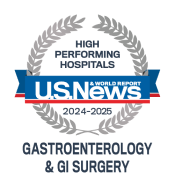Gastroesophageal Reflux Disease (GERD)

Heartburn is a common gastrointestinal symptom commonly triggered by acid refluxing from the stomach up into the food pipe (esophagus) – this is gastroesophageal reflux disease, commonly called GERD. GERD symptoms can run the gamut from a minor, infrequent irritation to a severe form that disrupts your quality of life and may result in Barrett’s esophagus and esophageal cancer.
GERD Diagnosis
At the University of Maryland Digestive Health Center, our experts will create a treatment plan based on the severity of your GERD. Diagnostic testing may include on-site abdominal imaging, endoscopy, state-of-the-art high-resolution esophageal manometry and ambulatory pH testing including BRAVO™ capsule studies, blood and stool tests, and maintaining a food and symptom diary.
GERD Treatment
Treatment approaches include providing advice regarding changes in nutrition, and diet, and exercise, and prescribing appropriate medications, including powerful suppressants of gastric acid secretion, and in some cases offering specialized endoscopic techniques that are performed only at specialized centers like ours.
For example, to treat Barrett’s esophagus and early esophageal cancers, we offer radiofrequency ablation, endoscopic mucosal resection and cryotherapy.
Diagnosis and treatment will be guided by the most up to date, evidence-based scientific and clinical research.

